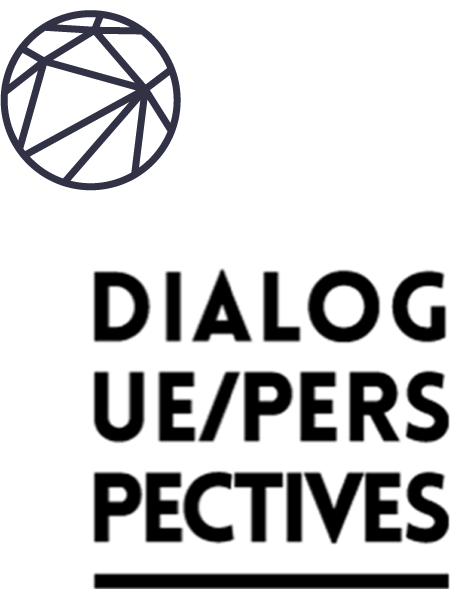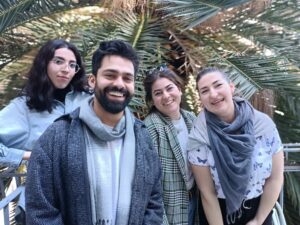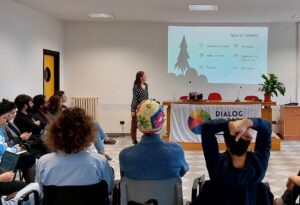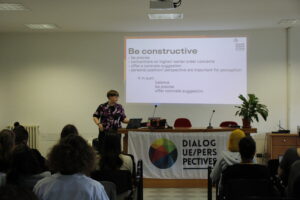Retrospect: Spring Seminar 2024
The Dialogue Perspectives Spring Seminar 2024 analyzed the shift to the right in Europe using the example of Italy. 50 European participants examined how the shift to the right was prepared, what effects it has and how it can be counteracted. Historical contexts such as fascism and the fragility of democratic norms were discussed. The diversity of religious and ideological backgrounds was researched in order to explore questions of identity in a changing society. The program promotes interreligious and worldview dialogue and social engagement. Concrete strategies were developed to work across national and community boundaries for a pluralistic European society.
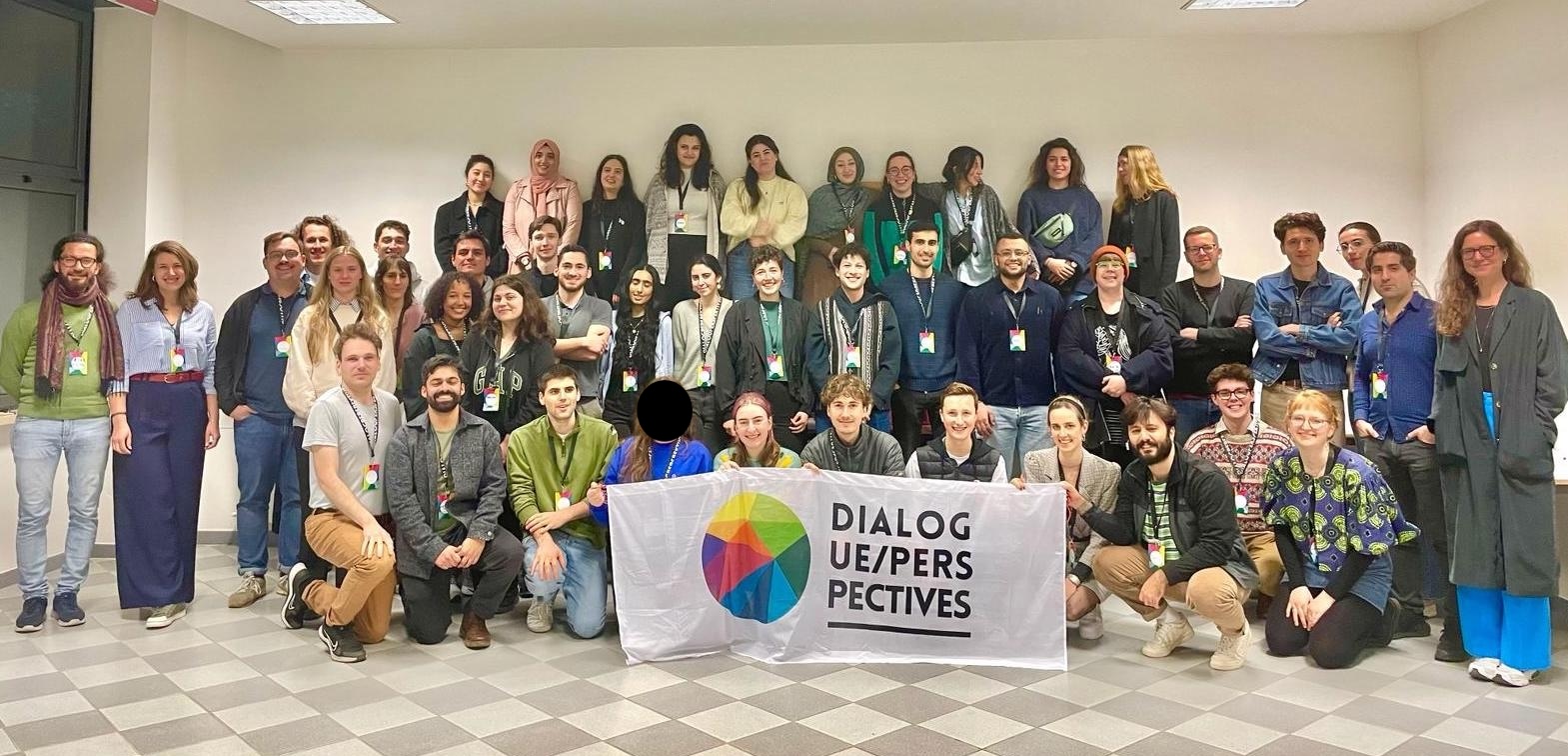
2024 is a hugely important election year in Europe. The elections to the EU Parliament are due on 9 June. The right-wing populists and right-wing extremists want to massively increase their number of seats. In recent years, the political course of many European societies has increasingly shifted to the right. Italy is no exception. Giorgia Meloni from the Fratelli d’Italia party leads the government there. Prime Minister Viktor Orbán and his right-wing populist Fidesz party are in power in Hungary, while Geert Wilders’ Party for Freedom (PVV) won the elections in the Netherlands. According to polls, the AfD is currently the second strongest party in Germany behind the CDU/CSU. In Poland, the national conservative PiS party, which had been in power since 2015, once again became the strongest force, but lost power to an alliance under Donald Tusk as no coalition partner was found. Another example is France, where Marine Le Pen from the Rassemblement National party lost the presidential election last year, but continues to shape public discourse on issues such as migration policy. The situation is similar with the right-wing populist Sweden Democrats, who are not represented in the cabinet but support the conservative-bourgeois government. It was precisely in this context that it was particularly important for Dialogue Perspectives to approach Italy as a case study at its spring seminar.
DialoguePerspectives has identified the shift to the right in Europe as one of the Core Conflicts threatening our European society. From 6 to 10 March 2024, 50 future European leaders from various countries had the opportunity to use Italy as a case study to examine how European societies experience this shift to the right, how it is prepared, what effects it has on various social actors and how it can be counteracted. Particular attention was paid to civil society and religious-ideological groups and their actions in a social environment that is characterized by anti-pluralism and a lack of diversity.
Together, historical dimensions such as fascism in Italy and its links to National Socialism and post-fascism were reflected upon, as well as the increasingly crumbling European consensus, which aims to strengthen open and liberal democracies. The fragility of democratic norms played a role here, as did the various levels at which these are exploited by right-wing forces. In particular, the dynamics of polycrises are increasingly being used by right-wing forces to transform plural democracies into homogeneous, authoritarian states. Dialogue Perspectives also looks beyond the borders of Europe and reflected on the situation of refugees, with a particular focus on Italy’s role in global conflicts.
Italy is at a crucial point today and is confronted with the resurgence of right-wing movements that want to impose a homogenous national identity. Against this backdrop, the seminar aimed to analyze Italy’s pluralistic and complex socio-political landscape and shed light on the challenges facing liberal democracies in the 21st century.
While Catholicism has long been dominant in Italy, and the Fratelli d’Italia in particular has repeatedly referred back to it, the seminar focused on the experiences of people from different religious and ideological backgrounds – Muslims and Jews, non-Catholic Christians and secular individuals – to explore questions of belonging and identity in a rapidly changing society. Throughout the seminar, participants attended lectures by local and national scholars as well as interactive workshops that provided valuable insights into the complex fabric of Italian society.
Notable encounters included meetings with Amy Rosenthal of Beth Hillel, who provided insights into Jewish history and life in Italy, and an interactive lecture by Elena Dini on the Catholic perspective on interfaith dialogue. Pastor Sarah Mae Gabuyo from the Methodist Church in Ponte Sant’Angelo gave a first-hand account of the challenges faced by Christian minorities in Rome. The participants also had the opportunity to discuss pressing social issues at meetings with organisations such as Libera, an anti-mafia movement, and MOSAiKO, a Catholic LGBT+ organization. The participants also had the opportunity to immerse themselves in the rich diversity of Muslim religious practices during a visit to the Islamic Cultural Centre of Rome and the Great Mosque with Imam Dr Nader Akkad, thus deepening their understanding of the diverse religious landscape.
The Dialogue Perspectives program is committed to a vision of a European society characterized by mutual appreciation and recognition of various forms of diversity. In view of the increasing polarization of society, it is of great importance for DialoguePerspectives, in addition to its content-related work, to provide participants with skills, methods and expertise to promote social dialogue for a better common future. In order to maintain, strengthen and defend this vision, dialogue is essential as a method for formulating and pursuing common goals.
The conflict between Israel and Hammas, in particular, repeatedly leads to controversy within the group of participants due to its religious and worldview dimensions and its close connection to various religious and ethnic identities. During this time, we have observed that many organizations avoid these disputes. Dialogue Perspectives, on the other hand, chooses a different approach: the path of joint work, listening, empathy and the common will to shape – through a sustainably conceived dialogue. The participants worked together across religious, ideological, linguistic and cultural boundaries and jointly developed goals for the coming program year and – more importantly – for the work in their own communities in their respective countries.
The participants worked together across religious, ideological, linguistic and cultural boundaries and jointly developed goals for the coming programme year and – even more importantly – for the work in their own communities in their respective countries. Dialogue Perspectives thus demonstrates once again this year the enormous potential of international civil society cooperation. This is the foundation on which we must continue to build.
“Especially now, when it is becoming clear that dialogue has been consistently neglected in recent years and solutions to the challenges facing our European societies are now being sought in ad hoc talks, the value of Dialogue Perspectives as a long-term, cooperative and robust European programme is becoming apparent: here, the struggle is not about the ‘how’ of dialogue, but about the ‘what’ of shaping it,” said Executive Director Johanna Korneli after the seminar.
